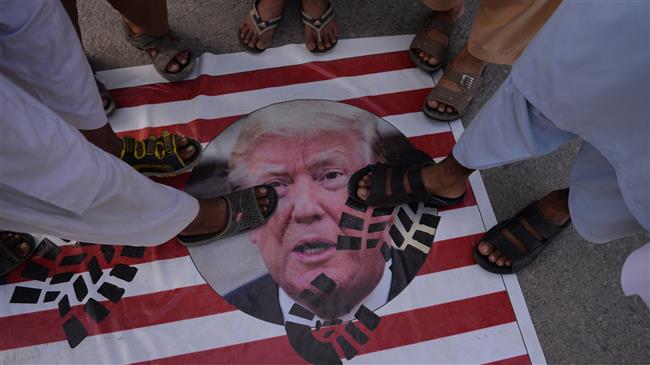
RNA - Pointing to the potential outbreak of a wider war in the Middle East as the result of Trump’s policy calls vis-à-vis Iran and Palestine, The Washington Post underlines in a Friday article that broadcast of scenes from Israeli killing of Palestinian protesters in Gaza, along with the footage of American and Israeli officials celebrating the new US embassy move to al-Quds, have led to a resurgence of Arab sympathies for the plight of the Palestinians while implicating Washington in the carnage.
It further added that Trump’s call to withdraw from the Iran nuclear pact days earlier “had already triggered concerns among friends and foes alike that he is steaming ahead in making major policy shifts without a coherent strategy for addressing the fallout.”
Describing Trump’s decisions on Iran and the embassy move as “recklessness that is frightening,” the daily further cites former CIA analyst and adviser to the US National Security Council, Bruce Riedel, as saying that either one of these steps would have caused havoc in the region by itself, but with both coming within a week of each other, amounted to a alarming recklessness.
Riedel, who is currently a US security and counter-terrorism expert with Washington-based think tank, the Brookings Institution, also expressed major concerns about the outcome of latest election in Iraq, saying: “The most dangerous place is probably Iraq, because we have a substantial American presence in Iraq,” point to heavy influence in the country of Iran, which has played a major role in assisting the Iraqi military defeat the Daesh (ISIL) terrorists across the nation.
The Iraqi election has given the largest number of seats in the nation’s parliament to anti-US cleric Moqtada al-Sadr, local news outlet reported citing unofficial figures.
According to analysts cited by the daily, even the closest US allies in the Persian Gulf “are growing uncomfortable with Trump’s policies, which they increasingly suspect are rooted more in his desire to fulfill election promises to his domestic base than in any alignment with their interests.”
“Trump was beginning to have momentum vis-a-vis Iran with the support of the other Arab countries, but after Gaza, it’s like he’s someone shooting himself in the foot,” said Riad Kahwaji of the Dubai-based Inegma defense consultancy. “When we have scenes like we saw in Gaza, Iran gains more popularity because Iran is the one advocating resistance against Israel.”
The feeling that Trump is undermining his allies “was compounded by the opening of the Jerusalem embassy on Monday, which thrust images of Israelis killing Palestinians back into the Middle East media for the first time in years and revived memories of an era when the United States was seen as the foremost enemy of Arab aspirations,” it added.
It further pointed to a recent headline of the pan-Arab Al-Hayatdaily that read, “The Massacre of Trump’s Declaration,” making it clear who the newspaper blamed for the deaths of 60 Palestinians by Israeli regime military forces.
Most ordinary Arabs in the region see Trump’s moves simply as “bizarre,” said American University of Beirut professor Rami Khouri as quoted in The Post report.
“The United States posture has shifted into a very unusual, predatory, chest-thumping bravado, and we’re seeing the results in the ratcheting-up of tensions,” he added. “But then they don’t take any action.”
According to Press TV, Khouri further emphasized that he doubts there will be a major war since the costs would be too high for everyone involved, and because Trump has clearly indicated he does not want to engage the US in military action.
The report also expressed worries about the developments in Yemen and the likelihood of Yemeni missiles striking one of the airport terminals in Saudi Arabia and causing mass casualties among Americans in the Persian Gulf dictatorship.
847/940